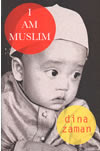sex, drugs, rock ‘n’ roll and transvestites
 Right now I’m reading I Am Muslim, a collection of essays (first published as a newspaper column, as far as I can tell) by Malay writer Dina Zaman. It’s a heavy-handed title for a light-hearted yet sincere book.
Right now I’m reading I Am Muslim, a collection of essays (first published as a newspaper column, as far as I can tell) by Malay writer Dina Zaman. It’s a heavy-handed title for a light-hearted yet sincere book. (I felt a little weird reading it on the plane last week, not so much because I thought someone would make a Muslims-are-terrorists assumption and be afraid of me, but because I thought I might be mistaken for a pretentious provocateur just daring a TSA employee to “randomly” search me. Like I was all, “Ooh, look at me, I’m holding a sign that says ‘I Am Muslim’ at the airport. Even though I’m not Muslim. I am sooo edgy.” Also, the insole of my sneaker somehow got folded under while re-shoeing after going through security and I wanted to take my shoe off and flatten it out so badly once I got on the plane, but it just seemed too shoe-bomber-esque. This is another reason why I have to start buying nicer clothes that don’t fall apart so easily.)
A more accurate title might be Am I Muslim? because most of the essays address what it means to be Muslim in the mode
For example, she ends one chapter called “After dark, my love,” a tale of her outing to a seedy restaurant featuring a drag show, by saying, “I heard more stories that night, but I’m sure you’ve heard them all before.”
I was thinking, No, I haven’t heard any of them! What’s an average night at a KL drag dive like?
But maybe Malaysians know. It’s interesting how drag queens, transvestites and MTF transsexuals seem to be highly visible in Southeast Asian culture. Zaman is a straight woman, but she mentions them frequently, as when rattling off typical temptations for young people. Apparently in
I just read the chapter titled “It’s a Muslim issue: How gay are you?” which included a very sweet, sad Q&A between Zaman and a closeted gay Muslim woman who admitted she was in search of a loophole in the Qur’an but hadn’t found one that sufficiently alleviated her guilt yet: “If religion allowed it—then bring it on! Look out girls, ha, ha, ha.”
Zaman seems ambivalent about homosexuality—she has gay friends, but she seems to take it as a given that they’re sinners. The question is more whether sinning is all that bad—she sort of treats it the way you might if you had a friend who was sleeping with a married person. You’re not for it, but you can see how it happens. She does quote one gay male friend who suggests that, since Muslims believe all God’s creations are perfect, God doesn’t have an issue with gay folks any more than he would have an issue with someone who was bo
Which raises the question, are you saying being gay is a disability? Followed by, are you saying having a disability is negative? But Zaman doesn’t take things to their conclusions, she just puts them out there—and for all I know, that’s huge.



Comments
Which raises the question, are you saying being gay is a disability?"
Despite not having the full context, I'll take a stab at this anyway. I read it as the guy using blindness as an example of perceived imperfection. Not for its disability status, but rather it's generally perceived imperfect status.
Maybe there was more underlying it though... What example could he have used that would have seemed appropriate to you?